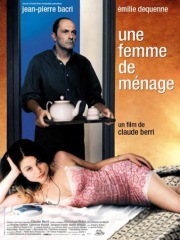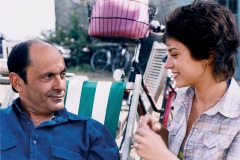|
The Housekeeper
aka Une femme de ménage
|
| |
 |
French language. France, 2002. Not rated.
90 minutes.
Cast:
Jean-Pierre Bacri, Émilie Dequenne, Jacques Frantz, Brigitte Catillon,
Axelle Abbadie, Catherine Breillat
Writer: Claude Berri, based on the novel by Christian Oster
Music: Frédéric Botton
Cinematographer: Eric Gautier
Producer: Claude Berri
Director: Claude Berri
LINKS
|
 h,
please.
h,
please.
That's the first reaction any sensible person should have to The Housekeeper,
the new movie from writer/director Claude Berri.
In a change from the epics of the past (Jean de Florette, Manon of the Spring,
Lucie Aubrac) Berri has made an intimate film with a small cast. It tries
to offer up a slice of life, but the slice crumbles. Basic ingredients are in
under-supply: characterization and believability.
The Housekeeper concerns Jacques (Jean-Pierre Bacri of The Taste
of Others and Place Vendôme), an embittered middle-aged sound engineer
whose wife Constance has left him some months prior. The opening shots establish
that he is adjusting poorly to his new life. His Paris apartment is dirtier
and messier than a college frat house on a Sunday morning. So he responds to
an ad offering housekeeping services, which turn out to be provided not by an
illegal and ill-treated African immigrant, but a gorgeous young French woman,
Laura (Émilie Dequenne of The Brotherhood
of the Wolf and Rosetta). Unbelievably, she moves in. It's only
a matter of time before the gratuitous topless shot followed by unsettling inter-generational
sex.
No woman could have written this script. It's the classic male fantasy: a pliant
young woman whose biscuits are in the oven and buns are in bed. It's not like
Jacques and Laura have sparkling conversation or smoldering chemistry. They
barely talk. Nor does he pursue her or force himself on her. She simply…makes
herself available.
The fact that he's not a smarmy jerk is the only reason Jacques retains any
audience sympathy. He is basically a decent guy, but he's sad, his life is a
wreck, and here's this pretty young thing offering herself to him. Yeah, why
not? That's how the liaison happens for Jacques. He seems aware that the situation
is absurd. How could he not be? It is absurd. Berri does try for some
laughs with their interactions (or lack thereof). She blasts popular music while
he tries to listen to classical; she reads People while he prefers Dostoevsky.
These differences aren't funny. They're normal. Rather than provoking laughter,
the scenes emphasize how distant the two really are.
Jacques knows perfectly well that things can't work, so he tries to keep Laura
at arm's length. Eventually, he allows her to draw him in, but we never get
the sense that his heart is fully in it. There is no real conflict here. There
is only a message—the classic male fantasy is impractical and not all that
desirable. As soon as Jacques starts to believe in it, it dissipates. What's
the point, though? Jacques never needed the lesson in the first place.
Jacques' problem is something else entirely. He remains angry and resentful
toward Constance and can't move on. The most interesting scene in the film—the
only scene with real dramatic tension—doesn't involve Laura at all, but
comes when his wayward wife (Catherine Breillat, director of Romance
and Fat Girl) shows up unexpectedly.
Laura is the titular character, but Berri offers us little insight into who
she is. She is only a catalyst for the adjustments Jacques must undergo. As
such, she is an incomplete character. She is a child, and she seems like she
must be deeply scarred to fall for Jacques and crave his affirmation. It's not
like Jacques is a dashing older gentleman seducing her with glamour and knowledge
of the ways of the world. He's just a depressing bald guy. There are even times
when you suspect Laura might be deeply psychotic. But no, this film doesn't
go the way of Takashi Miike's Audition. Berri finally seems to suggest
cavalierly that there's nothing wrong with Laura that a little growing up won't
fix.
Awkwardly, the relationship between Jacques and Laura is the film's primary
focus when it is not the primary concern. The film wants to be more about the
difficulties of adjusting to divorce and middle age. Indeed, Berri and novelist
Christian Oster talk about the story in those larger terms. All of Jacques'
friends and acquaintances are without exception going through divorces, separations,
or bereavements as well—even the bartender. Jacques' squalid apartment
is a container for his lonely, disheveled life. The housekeeper comes to restore
order, and finally, Jacques may realize he doesn't need her to keep order anymore.
However, if that's the true meaning of the film, a more realistic plot would
have been welcome, as well as a restructured story that communicates something
about Jacques and his wife Constance. As it is, The Housekeeper offers
only vague observations and shallow insights.
Review
© July 2003 by AboutFilm.Com and the author.
Images © 2003 Palm Pictures. All Rights Reserved.


